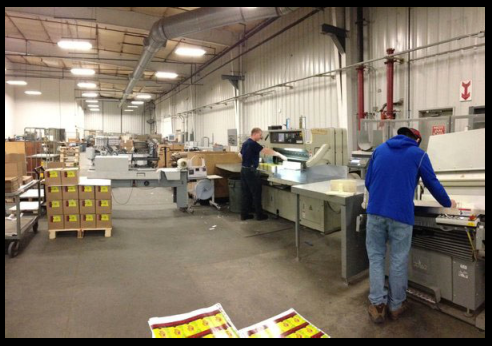In January 2015, Cayuga Press of Cortland combined their business with Midstate Printing Corporation and Quartier Printing of Syracuse with the goal of remaining a staying power in the printing industry.
“In our business, what we see is that printing companies are going out of business left and right,” Joe Shelton, an account executive at Cayuga Press of Cortland said. “People are not investing in technology and not investing money into the machinery and keeping everything new.”
The business move between the printing businesses was one of 24 in the country, Tom Quartier, president of Quartier Printing said. The companies were driven to make the merger in order to stay competitive in the business.
“There were 24 mergers or acquisitions of printing companies in the month of January 2015 and four additional companies went bankrupt,” Quartier said. “Twenty-eight companies were affected either negatively or positively, and as you go to a merger or acquisition, those are all the positive ones.”
The printing companies are just a small percentage of companies that have been maneuvering in deals lately. According to an article in Fortune magazine, global mergers and acquisitions in the business world totaled $3.5 trillion in 2014, a 47 percent increase from 2013.
Rebecca Jarvis, chief business and finance correspondent for ABC News and former investment banking analyst for Bank of America, explained a merger is more than just pushing two companies together.
“It’s not as simple as taking some tape and wrapping the two companies together, they’re so many things that need to be considered,” Jarvis said. “Every single thing gets pushed over, and that takes time. It’s a magnificent task.”
A possible reason for an increase in this specific business move worldwide could be the seeking of synergy, Jarvis said.
“What it basically means is that these two companies, by coming together, are saving money; they’re combining business activities, they’re helping to increase their performance and decrease their cost,” she said.
Synergy needs to exist in more than just the financial aspect of the companies in order for a merger or acquisition to be successful. Michael Crawford, founder of The Merger Expert, said most of the time, he is able to tell if companies will be good matches for each other based on the culture and attitude among the employees.
“Any time a business makes any kind of move, people get nervous. They’re asking questions, they’re trying to push their agendas,” Crawford said. “If the executives are able to come in with one set plan and one set goal in mind, it makes it that much easier to ease the minds of everyone else.”
The three printing companies merger success is due to the shared values, goals and culture, Quartier said.
“Our work flow changed to a hybrid of what all three companies had,” he said. “We took the best from each, and put them into one package and actually have a better process that the clients like.”
Other Ithaca businesses have merged in the past, with similar goals of increasing success. The two non-profit organizations Paleontological Research Institute and Cayuga Nature Center merged in 2011 with the motivation of having a larger pool of resources.
“The nature center had huge fiscal assets and the property, the view, the name, and all of those, PRI didn’t have,” Warren D. Allmon, director of the Museum of the Earth, said. “If you look at it business analytically, [the merger] made sense.”
The merger for the organizations also provided room for making improvements on the two sites.
“The perhaps not surprising surprise is that everything takes longer and costs more than you project. We spent about $750,000 on the process of merging,” Allmon said. “We spent $250,000 last year and that was for the improvements to the lodge, handicap accessibility, new entrance, new lobby. We’re about to spend another million and a half dollars on just capital improvements.”
For Shelton at Cayuga Press, the mergers and the investment into the company means something more.
“The owners are making sure that our companies is strong and we’re in it for the long run,” Shelton said. “I’ve been with Cayuga Press for 15 years, and [this merger] gives me hope that I can make this my career.”













